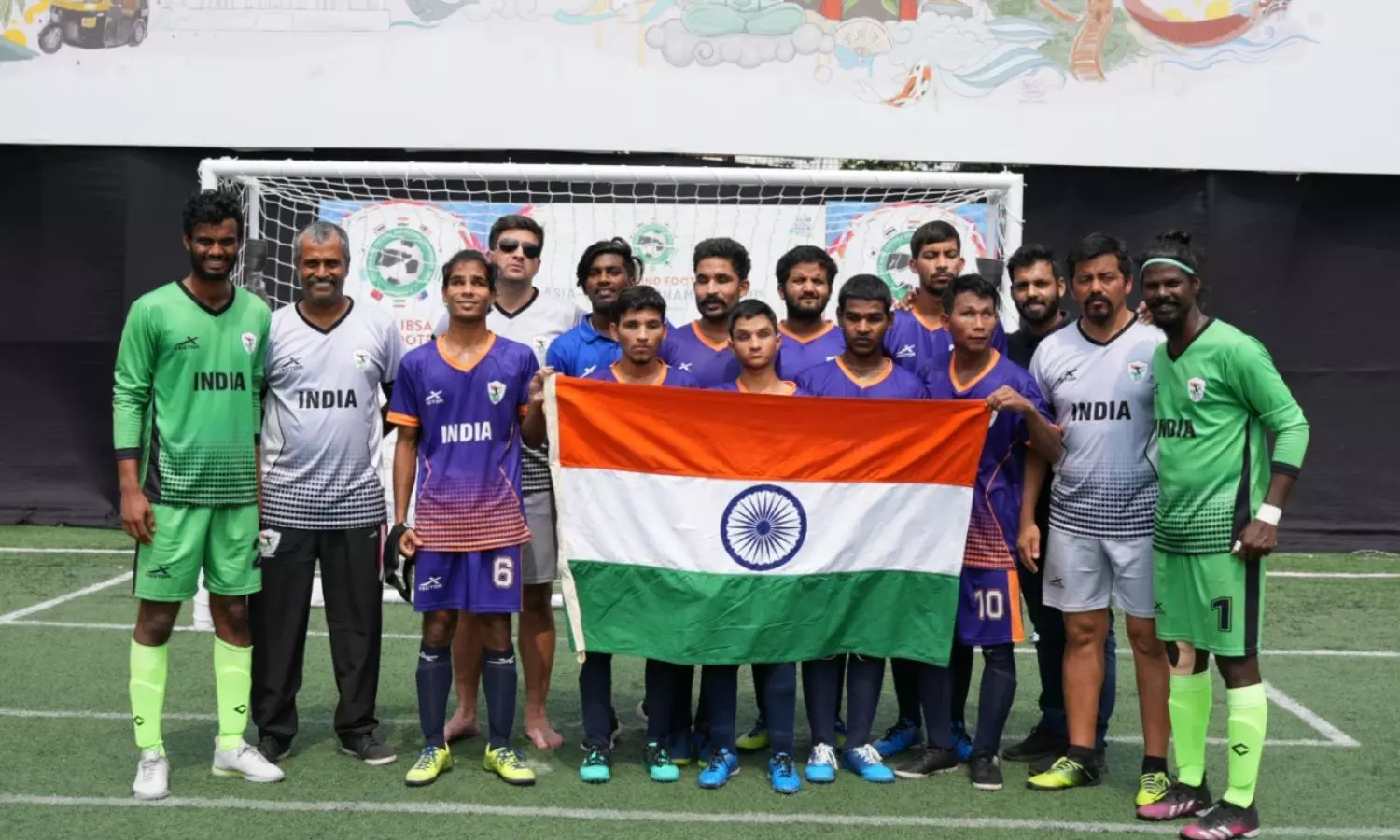Football
Same sport, different ball game: Blind Football and its rise in India
Being 6th in Asia and 25th in the world, Blind football is surely heading towards the right direction in India.

Indian men's blind football team (Source: Sunil Mathew)
Breaking fresh grounds, the Indian Women's Blind Football team booked a berth for the World Championships set to be held in 2023 in Birmingham. The team recently took part in the IBSA (International Blind Sports Federation) Blind Football Asia/Oceania Championship in Kochi, Kerala, which took place between 11th-18th November.
Apart from India, the Japanese too fielded a women's team, and by default, both of them got entry into the world championships the next year. "This was the first time we fielded such a team and the first time Asia hosted such an event. By default, both of us (India and Japan) got entry into the world championships as Asia's representatives," said Sunil Mathew, the head coach of the Indian teams.
"It's been great. The girls first practiced in Pune, where we have a centre, working through a local organization. After that, we moved the team down to Kochi for the tournament," Matthew added, who's also the Sporting Director of the IBFF (Indian Blind Football Federation).
The Asian Championships, apart from a qualifier for the 2023 Worlds, was also a qualifying tournament for the 2024 Paris Paralympics. However, this didn't apply to women.
Blind football is yet to incorporate the women's category in its ranks at the 2024 Paralympics, but if all goes well, Coach Matthew hopes the same will happen in the Los Angeles 2028 tournament.
The Indian men's team finished 7th in the Asian championships and didn't qualify for the Worlds or the Olympics. However, the step achieved by the women's team is surely a boost of confidence for these visually-impaired and passionate footballers.
The sport's landscape has slowly but surely changed for the better in the last 10 years for men, and in the last three years for women. "The players have largely come forward through their own initiative as they too want to show the world that they can do something which others can do. They have the inherent will to express themselves, and the major takeaway is that they become confident in their daily lives," Sunil said.
Matthew also touches upon how these players, both men, and women, have been told to be careful and always have had someone to hold their hands all their lives. Once they go onto the field, kick the ball, hear a player tackle, and score against a sighted keeper nonetheless, the feelings they experience can't be explained through words.
The sport's gradual rise in India
A sport so similar yet so different than the variant played by able-bodied athletes, blind football was involuntarily present across schools in India. The game used to have an ad-hoc avatar organized by the IBSA. At that time, there wasn't any formal body for blind football, which changed in 2016.
"We tied up with them (Indian Blind Sports Association) and one of our teams from Kerala went for the nationals in 2013, and after that, we formally formed the IBFF. Since then, we have been holding regionals as well as nationals," Sunil explained the formation of the body.
In September, they had their biggest nationals to date, which saw 16 men's teams and 6 women's teams take part. Apart from states like Meghalaya and Gujarat, others are yet to join hands and support this very nascent sport in the country.
"We are a start-up sort of a sport right now in India. It isn't easy to get traction, but slowly it's spreading around. Here's hoping that in the next couple of years all state affiliates, backed by their states, register with us," the coach-cum-director said.
Same sport, different ball game
"When I work with regular coaches, I actually have to de-brief them (laughs). This game (blind football) is purely based on skill, intuition, hearing capacity, and the inherent skills of the blind player," Mathew explains the difference between the two sides of the sport.
Sunil Mathew
While a coach can simply point or ask a sighted footballer to hit the ball a certain way, the same cannot take place in this world. One has to make them touch the ball and teach them how to kick and when to kick. Moreover, one has to paint a picture of the goal for them and make them feel the frame of the same.
Despite the fields being 1/3rd of the size of a regular football field, the work which goes in is a lot. "When you coach, it's a way of giving back. Nobody has paid a coach in India, we wish that happens down the line, but we give our time to them. Most of us are linked with blind schools or institutions, but it's all voluntary work," he said.
Mathew hopes to get more female coaches into the fray as he would like to have one coach leading the line and himself somewhere in the background, overseeing everything.
More than their coaching unit, the IBFF's referee unit is more professional. According to Mathew, a coach shouldn't come to this game for money, because as of now, there's none. The main takeaway should be their own commitment.
When passion meets work
Mr. Mathew loves to follow the sport and has been part of an NGO which works with visually-impaired people for the last 20 years. As he says, both of his loves sort of fused which led to his current stint as a part of the blind football federation.
"Passion, working with the visually challenged, and love for the game, all contributed to me coming into this sphere. We've done pretty well, we are 6th in Asia and 25th in the world and hoping that the girl's team do well in the upcoming world championships," he concluded.
